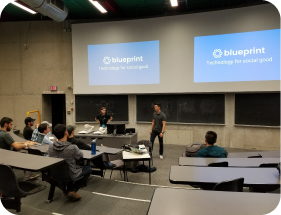For Nonprofits
We're a group of University of Waterloo students that solve technical problems for nonprofit organizations - all free of charge.
What we can do for you
1
HELP DETERMINE WHERE OUR SERVICES CAN MAKE AN IMPACT
We recognize that sometimes it can be challenging to pinpoint exactly how a technology solution can add value to your organization. However, with a proven track-record of delivering tech-enabled impact, we believe in the power of technology to better organizational efforts in the social sector. Which is why our process begins with a series of calls dedicated to project-scoping in order to help us identify what the best solution for your organization looks like.
2
SPEARHEAD TECH-ENABLED PROJECTS WITH HIGH-CALIBRE TEAMS AND CLEAR COMMUNICATIONS
UW Blueprint leverages a comprehensive hiring process in order to bring on the most tenacious and passionate student leaders. Our skillful team of developers and designers have in-industry experience as product managers, software developers, designers, and technical leaders at companies including Facebook, Google, and Shopify to name a few. With that said, our committed students will get the job done with minimal hand holding - in order to support you in doing what you do best, better.
3
DELIVER HIGH QUALITY SOFTWARE SOLUTIONS
From website redesigns and application developments, to system optimization efforts, our team delivers innovative products of the highest quality. With sustainability always top-of-mind, we are also committed to providing your team with the necessary training and resources to maintain the solutions built uniquely for you by your UW Blueprint team.
“Each step of the way, Blueprint’s team asked lots of questions to ensure what they were developing matched expectations, and were transparent around their processes. From building in the ability to rank applications to ensuring the portal’s colours matched our brand, they were responsive to our requests, and fantastic to work with.”
-
Taryn Graham
Operations & Communications Manager at SVPWR
Our Process
Phase One
Project discussion and collaborative scoping
To kickstart the collaboration process, our teams will work closely with the nonprofit to gain a greater understanding of project needs and priorities as well as scope out the minimum viable product (MVP). From this point, the product manager will curate a statement of work (SOW) that defines project scope capturing the discussion with the nonprofit.
Phase Two
Building the Minimum Viable Product (MVP)
This second phase is where the magic begins! Our teams work hard to get the MVP up and running. Throughout this phase, we will stay in touch with the nonprofit to ensure smooth development and consistent alignment.
Phase Three
User Testing
Once the MVP is built and released to an initial group of end users, we conduct rigorous testing to make sure no critical problems remain. Additionally, we will take note of any bugs, UX issues, and feature requests during this time.
Phase Four
Product polish and hand-off
This phase involves intensive development and design work. Our team will execute improvements on the product based on feedback received from the user testing phase. The objective of this final phase is to ensure the quality and completeness of the finished product. Upon product completion, our team will meet with the nonprofit to walk through maintenance best practices before hand off.
Project discussion and collaborative scoping
To kickstart the collaboration process, our teams will work closely with the nonprofit to gain a greater understanding of project needs and priorities as well as scope out the minimum viable product (MVP). From this point, the product manager will curate a statement of work (SOW) that defines project scope capturing the discussion with the nonprofit.

Decision Criteria
Projects selected to be apart of our next cohort will be determined against the following criteria:
1. Impact Potential
What is the breadth and depth of impact this project will provide toward the community? Projects that generate the greatest levels of social impact will be prioritized for selection by our team.
2. Necessity
To what extent is project execution crucial to the nonprofit? Are there alternative ways that the organization can overcome their challenges without technology? We want to ensure that we are helping organizations that truly need our services.
3. Scope
Is project completion realistic within our team’s timeline? We want to uphold accountability to completing high calibre projects and delivering results within a reasonable time frame.
4. Technical fit
Is the core of the project rooted in technology and aligned with our core capabilities? In order to ensure best results, we want to make sure only projects that fit well within our team’s area of expertise are selected.
5. Credibility
Is it clear that the project will generate a measurable and intentional impact? Working with nonprofits that have a proven track record of doing good is highly important for our team, and we love to be able to provide evidence of project impact!